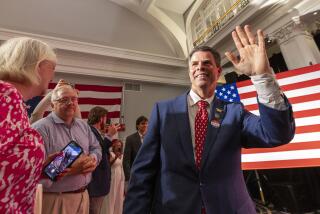Democrat Regains Lead in Washington Senate Race
- Share via
SEATTLE — Democrat Maria Cantwell pulled narrowly ahead of GOP incumbent Slade Gorton on Tuesday in a race that could well leave the political balance in the U.S. Senate undetermined until after a recount.
The contest had been all-but-decided in Gorton’s favor last week, but Cantwell made a strong showing in late-counted ballots from Seattle; she also gained unexpected support in several Republican strongholds elsewhere in Washington.
It marked the first time that the dot-com millionaire has been ahead in the race since election night. But her lead was a mere 1,823 votes. And with more than 3,000 ballots still to be counted before today’s 5 p.m. reporting deadline, neither side was making any predictions.
Gorton’s staff, which had tentatively planned a victory news conference for Tuesday afternoon, remained locked inside the senator’s campaign office, scrutinizing the returns. Republican officials and Gorton campaign workers did not return phone calls after the vote turnaround.
But Ellis Conklin, Cantwell’s spokesman, said: “We’re very encouraged. But it’s still too early to say. It’s going to come right down to the wire.” Ballots expected to be counted today from the Spokane area, where Gorton has done well, could reverse the lead again.
“To be perfectly honest, yesterday morning I was preparing myself for the worst,” said state Democratic Party chairman Paul Berendt. “But yesterday and today, we’ve outperformed our expectations by a large margin in three important counties, and we have not fallen below our expectations anyplace. So hope springs eternal.”
“The planned victory celebration at Gorton headquarters was wildly premature,” added Jim Jordan, political director for the Democratic Senatorial Campaign Committee in Washington, D.C. “It’s so close at this point that the last handful of votes will determine the winner.”
Indeed, with an automatic recount likely, Berendt was predicting an exhaustive review of the ballots, focusing on individual anomalies that could affect the total count--not unlike the scene in Florida.
In many respects, Washington’s down-to-the-wire race--which, if Cantwell wins, could produce a 50-50 split in the Senate--has mirrored the close count and the deep political divisions in the presidential showdown.
“In the state of Washington, we’re oftentimes the snap at the end of the whip,” Berendt said. “In ‘92, when there was a strong Democratic trend throughout the nation, we had an extremely strong Democratic trend. In ‘94, when there was a Republican trend in the rest of the country, we lost six congressional seats. And this year, when we’ve seen a near-deadlock for the presidency, what do we have? We have a U.S. Senate race that’s a virtual tie, and a 49-49 split in our Legislature here. So we tend to accentuate whatever is going on in the rest of the nation.”
The Senate race has turned on many of the same issues that drove a wedge into the national electorate: environmental protection weighted against appropriate use of resources, protection of the Social Security system and the best way to keep a thriving economy on track.
The 41-year-old Cantwell, who poured $9.6 million of her own money into the race, appealed to environmentally minded voters in Seattle and other areas west of the Cascade mountains by calling for breaching the hydropower dams on the Snake River that threaten salmon. She also attacked Gorton’s support of a controversial cyanide-leach gold mine in north-central Washington.
Indian tribes throughout the country threw their support behind Cantwell in a revolt against the three-term incumbent’s long-standing attacks on Native American sovereignty.
But Gorton’s position on the mines and his support for restarting a controversial nuclear reactor on the Hanford reservation in central Washington earned him key support east of the Cascades and in a number of other rural Washington counties.
Automatic recounts are triggered under Washington law for any race that is within 0.5%, as the Senate race likely will be. More than 2.3 million votes were cast for the two candidates.
*
Times staff writer Nick Anderson in Washington, D.C., contributed to this story.
More to Read
Get the L.A. Times Politics newsletter
Deeply reported insights into legislation, politics and policy from Sacramento, Washington and beyond. In your inbox twice per week.
You may occasionally receive promotional content from the Los Angeles Times.










